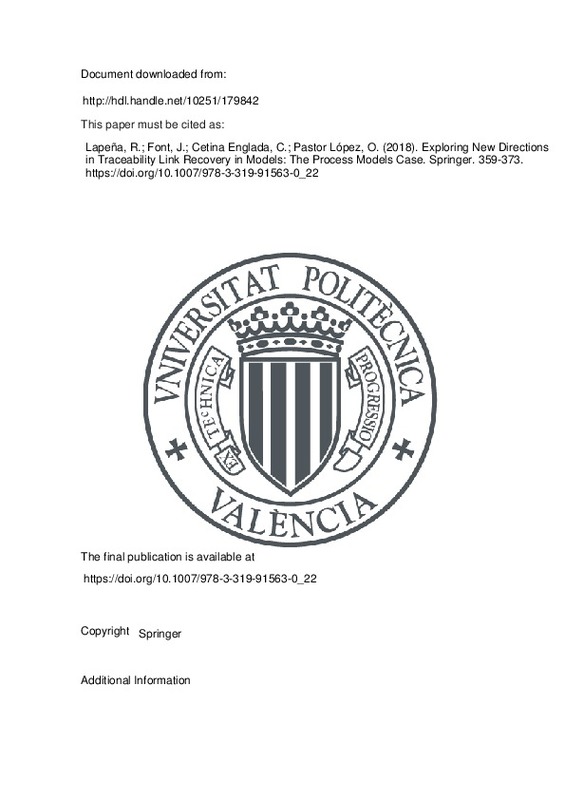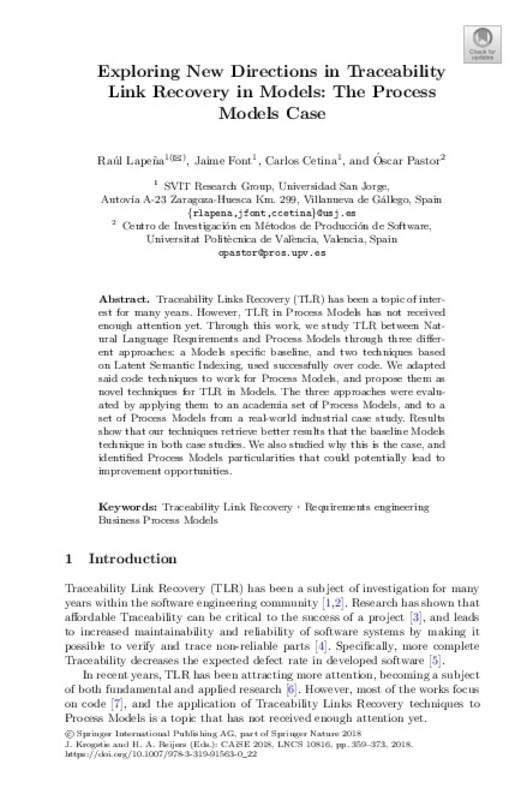Gotel, O.C., Finkelstein, C.: An analysis of the requirements traceability problem. In: Proceedings of the First International Conference on Requirements Engineering, pp. 94–101. IEEE (1994)
Spanoudakis, G., Zisman, A.: Software traceability: a roadmap. Handb. Softw. Eng. Knowl. Eng. 3, 395–428 (2005)
Watkins, R., Neal, M.: Why and how of requirements tracing. IEEE Softw. 11(4), 104–106 (1994)
[+]
Gotel, O.C., Finkelstein, C.: An analysis of the requirements traceability problem. In: Proceedings of the First International Conference on Requirements Engineering, pp. 94–101. IEEE (1994)
Spanoudakis, G., Zisman, A.: Software traceability: a roadmap. Handb. Softw. Eng. Knowl. Eng. 3, 395–428 (2005)
Watkins, R., Neal, M.: Why and how of requirements tracing. IEEE Softw. 11(4), 104–106 (1994)
Ghazarian, A.: A research agenda for software reliability. In: IEEE Reliability Society 2009 Annual Technology Report (2010)
Rempel, P., Mäder, P.: Preventing defects: the impact of requirements traceability completeness on software quality. IEEE Trans. Softw. Eng. 43(8), 777–797 (2017)
Parizi, R.M., Lee, S.P., Dabbagh, M.: Achievements and challenges in state-of-the-art software traceability between test and code artifacts. IEEE Trans. Reliab. 63(4), 913–926 (2014)
Rubin, J., Chechik, M.: A survey of feature location techniques. In: Domain Engineering, pp. 29–58. Springer, Heidelberg (2013)
Spanoudakis, G., Zisman, A., Pérez-Minana, E., Krause, P.: Rule-based generation of requirements traceability relations. J. Syst. Softw. 72(2), 105–127 (2004)
Landauer, T.K., Foltz, P.W., Laham, D.: An introduction to latent semantic analysis. Discourse Processes 25(2–3), 259–284 (1998)
Hulth, A.: Improved automatic keyword extraction given more linguistic knowledge. In: Proceedings of the 2003 Conference on Empirical Methods in Natural Language Processing. Association for Computational Linguistics, pp. 216–223 (2003)
Plisson, J., Lavrac, N., Mladenic, D., et al.: A rule based approach to word lemmatization. In: Proceedings of the 7th International Multi-conference Information Society, vol. 1, pp. 83–86. Citeseer (2004)
Marcus, A., Sergeyev, A., Rajlich, V., Maletic, J.: An information retrieval approach to concept location in source code. In: Proceedings of the 11th Working Conference on Reverse Engineering, pp. 214–223, November 2004
Salman, H.E., Seriai, A., Dony, C.: Feature location in a collection of product variants: combining information retrieval and hierarchical clustering. In: The 26th International Conference on Software Engineering and Knowledge Engineering, pp. 426–430 (2014)
Salton, G., McGill, M.J.: Introduction to Modern Information Retrieval. McGraw-Hill Inc., New York (1986)
Leech, G., Garside, R., Bryant, M.: CLAWS4: the tagging of the British National Corpus. In: Proceedings of the 15th Conference on Computational Linguistics, vol. 1, pp. 622–628. Association for Computational Linguistics (1994)
Camunda: Camunda BPMN Model API (2017). https://github.com/camunda/camunda-bpmn-model . Accessed 3 Nov 2017
Apache: OpenNLP Toolkit for the Processing of Natural Language Text (2017). https://opennlp.apache.org/ . Accessed 12 Nov 2017
Abeles, P.: Efficient Java Matrix Library (2017). http://ejml.org/ . Accessed 9 Nov 2017
Wohlin, C., Runeson, P., Höst, M., Ohlsson, M.C., Regnell, B., Wesslén, A.: Experimentation in Software Engineering. Springer, Heidelberg (2012)
Sultanov, H., Hayes, J.H.: Application of swarm techniques to requirements engineering: requirements tracing. In: 18th IEEE International Requirements Engineering Conference (2010)
Sundaram, S.K., Hayes, J.H., Dekhtyar, A., Holbrook, E.A.: Assessing traceability of software engineering artifacts. Requirements Eng. 15(3), 313–335 (2010)
Duan, C., Cleland-Huang, J.: Clustering support for automated tracing. In: Proceedings of the 22nd IEEE/ACM International Conference on Automated Software Engineering (2007)
Falessi, D., Cantone, G., Canfora, G.: Empirical principles and an industrial case study in retrieving equivalent requirements via natural language processing techniques. Trans. Softw. Eng. 39(1), 18–44 (2013)
Arora, C., Sabetzadeh, M., Goknil, A., Briand, L.C., Zimmer, F.: Change impact analysis for natural language requirements: an NLP approach. In: IEEE 23rd International Requirements Engineering Conference (2015)
Ryan, K.: The role of natural language in requirements engineering. In: Proceedings of IEEE International Symposium on Requirements Engineering (1993)
De Lucia, A., Fasano, F., Oliveto, R., Tortora, G.: Enhancing an Artefact management system with traceability recovery features. In: Proceedings of the 20th IEEE International Conference on Software Maintenance, pp. 306–315. IEEE (2004)
Eder, S., Femmer, H., Hauptmann, B., Junker, M.: Configuring latent semantic indexing for requirements tracing. In: Proceedings of the 2nd International Workshop on Requirements Engineering and Testing (2015)
[-]










